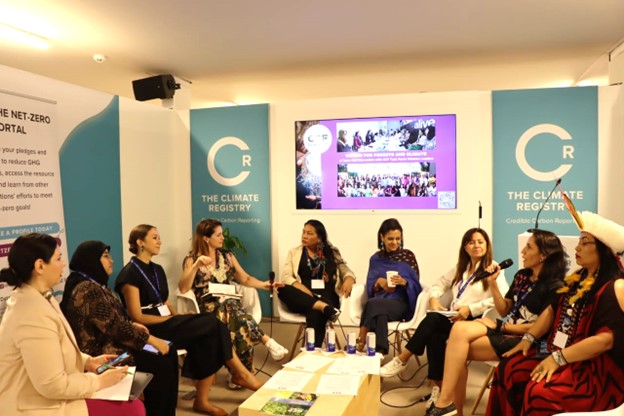In continuation of a tradition that began in Egypt last year during COP 27 and continued with the release of our gender policy in February 2023 at our 13th Annual Meeting in Yucatan, the GCFTF hosted a transformative space for women leaders dedicated to forests and climate. This year’s Women for Forests and Climate Town Hall at COP28 in December 2023 was marked by a captivating opening chant by Nedina Xiu Yawanawa, heralding an insightful and empowering discussion.
Facilitated by Coleen Scanlan Lyons from the Global Secretariat, the panel featured an esteemed roster of women leaders including Francisca Arara (Secretary of Indigenous People for Acre, Brazil), Christina Snider-Ashtari (Tribal Advisor for Governor Newsom of California), Huguette Hernandez Gomez (Secretary of Environment, Quintana Roo, Mexico), Nedina Xiu Yawanawa (Acre, Brazil), Natalie Flores (Vice-Chair of the UN Climate Change Subsidiary Body for Scientific and Technological Advice), and Mercedes Garcia Madero (Chief Implementation Officer at ALCOTT). Accompanied by the GCF Task Force’s Country Directors Syahrina D. Anggraini (Indonesia), Fabiola Muñoz Dodero (Peru), Silvia Llamas (Mexico), and Martha Fontes (Global Secretariat), the circle was vibrant with diverse expertise.
Natalie Flores emphasized the importance of understanding the formal UNFCCC procedure for incorporating new parameters like gender, stressing the need for inclusivity in international climate initiatives. Francisca Arara shared her passionate commitment to empowering women and preserving the environment, while Christina Snider-Ashtari shed light on the challenges faced by tribal communities in the face of climate change – and the role women in positions of power as elected officials have to elevate the voices of other women.
Neidina added a profound dimension to the conversation by introducing the concept of necropolitics, underscoring how unfair protocols and participation processes can imprison indigenous people, particularly women. This concept emphasizes the urgent need to address power imbalances and create spaces for marginalized communities to actively participate in shaping climate policies.
Mercedes Garcia Madero, Chief Implementation Officer at ALCOTT, provided an organizational perspective, emphasizing the importance of translating ideas into concrete actions. Syahrina and Fabiola contributed valuable insights into regional efforts. The panel showcased the multifaceted nature of climate action, intertwining gender considerations, indigenous perspectives, and global cooperation.
Incorporating a gender perspective in climate change discussions has profound implications. Gender mainstreaming ensures acknowledgment of the unique needs and vulnerabilities of women, recognizing their valuable contributions in natural resource management, agriculture, and community resilience—making their involvement crucial in climate adaptation and mitigation efforts.
As the Women for Forests and Climate Town Hall concluded, the resounding message was clear: collaboration, inclusivity, and empowerment are essential elements in the global fight against climate change. The impact of these women’s insights, coupled with ongoing initiatives, will undoubtedly ripple through future environmental discussions, shaping a more equitable and resilient world for generations to come. You can access the complete recording here.
Looking ahead, the journey continues with a technical meeting scheduled in Bolivia in 2024, providing an opportunity for stakeholders to collaborate on technical aspects critical to advancing climate action, with the necessary incorporation of a gender lens in the work being developed in our member jurisdictions.

